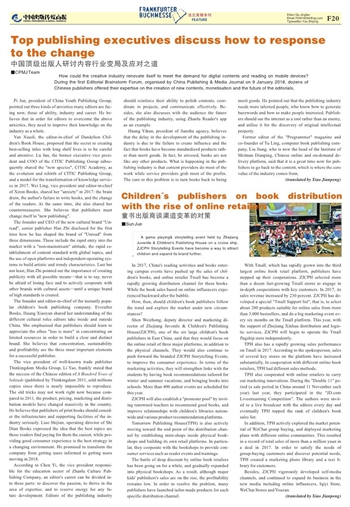How could the creative industry renovate itself to meet the demand for digital contents and reading on mobile devices? During the first Editorial Brainstorm Forum, organised by China Publishing & Media Journal on 9 January 2018, dozens of Chinese publishers offered their expertise on the creation of new contents, monetisation and the future of the editorials.
Pi Jun, president of China Youth Publishing Group, pointed out three kinds of anxieties many editors are facing now, those of ability, industry and career. He believes that in order for editors to overcome the above anxieties, they need to improve their knowledge on the industry as a whole.
Yan Xiaoli, the editor-in-chief of Dandelion Children's Book House, proposed that the secret to creating best-selling titles with long shelf lives is to be careful and attentive. Lu Jun, the former executive vice president and COO of the CITIC Publishing Group subsequently shared the "new species", CITIC Academy, as the evolution and rebirth of CITIC Publishing Group, and a model for the transformation of knowledge services in 2017. Wei Ling, vice president and editor-in-chief of Xiron Books, shared her "anxiety" in 2017: the brain drain, the author's failure to write books, and the change of the readers. At the same time, she also shared her countermeasures. She believes that publishers must change itself to "new publishing".
The founder and CEO of the new cultural brand "Unread", senior publisher Han Zhi disclosed for the first time how he has shaped the brand of "Unread" from three dimensions. These include the rapid entry into the market with a "non-mainstream" attitude, the rapid establishment of content standard with global topics, and the use of open platforms and independent operating systems to build artistic and trendy characteristics. Last but not least, Han Zhi pointed out the importance of creating publicity with all possible means—that is to say, never be afraid of losing face and to actively cooperate with other brands with cultural assets—until a unique brand of high standards is created.
The founder and editor-in-chief of the instantly popular children's book publishing company, Everafter Books, Huang Xiaoyan shared her understanding of the different cultural roles editors take inside and outside China. She emphasised that publishers should learn to appreciate the ethos "less is more" in concentrating on limited resources in order to build a clear and distinct brand. She believes that concentration, sustainability and profitability are the three most important elements for a successful publisher.
The vice president of well-known trade publisher Thinkingdom Media Group, Li Yao, frankly stated that the success of the Chinese edition of A Hundred Years of Solitude (published by Thinkingdom 2011, sold millions copies since then) is nearly impossible to reproduce. The old tricks may not work right now because compared to 2011, the product, pricing, marketing and distribution models have changed massively in the country. He believes that publishers of print books should consider the infrastructure and supporting facilities of the industry seriously. Liao Shijian, operating director of Shi Dian Books expressed the idea that the best topics are those readers find paying for them the easiest, while providing good consumer experience is the best strategy in a changing environment. He promised to transform the company from getting users informed to getting users moving in 2018.
According to Chen Yi, the vice president responsible for the education sector of Zhanlu Culture Publishing Company, an editor's career can be divided into three parts: to discover the passion, to thrive in the area of expertise, and to reserve energy for any future development. Editors of the publishing industry should reinforce their ability to polish contents, coordinate in projects, and communicate effectively. Besides, she also discusses with the audience the future of the publishing industry, using Zhanlu Reader's app as an example.
Huang Yikun, president of Jianshu agency, believes that the delay in the development of the publishing industry is due to the failure to create influence and the fact that books have become standardized products rather than merit goods. In fact, he stressed, books are not like any other products. What is happening in the publishing industry is that content providers do most of the work while service providers grab most of the profits. The cure to this problem is to turn books back to being merit goods. He pointed out that the publishing industry needs more talented people, who know how to generate buzzwords and how to make people interested. Publishers should see the internet as a tool rather than an enemy, and utilise it for the discovery of original intellectual property.
Former editor of the "Programmer" magazine and co-founder of Tu Ling, computer book publishing company, Liu Jiang, who is now the head of the Institute of Meituan Dianping, Chinese online and on-demand delivery platform, said that it is a great time now for publishers to go back to the content, which is where the core value of the industry comes from.
(translated by Xiao Jianpeng)


